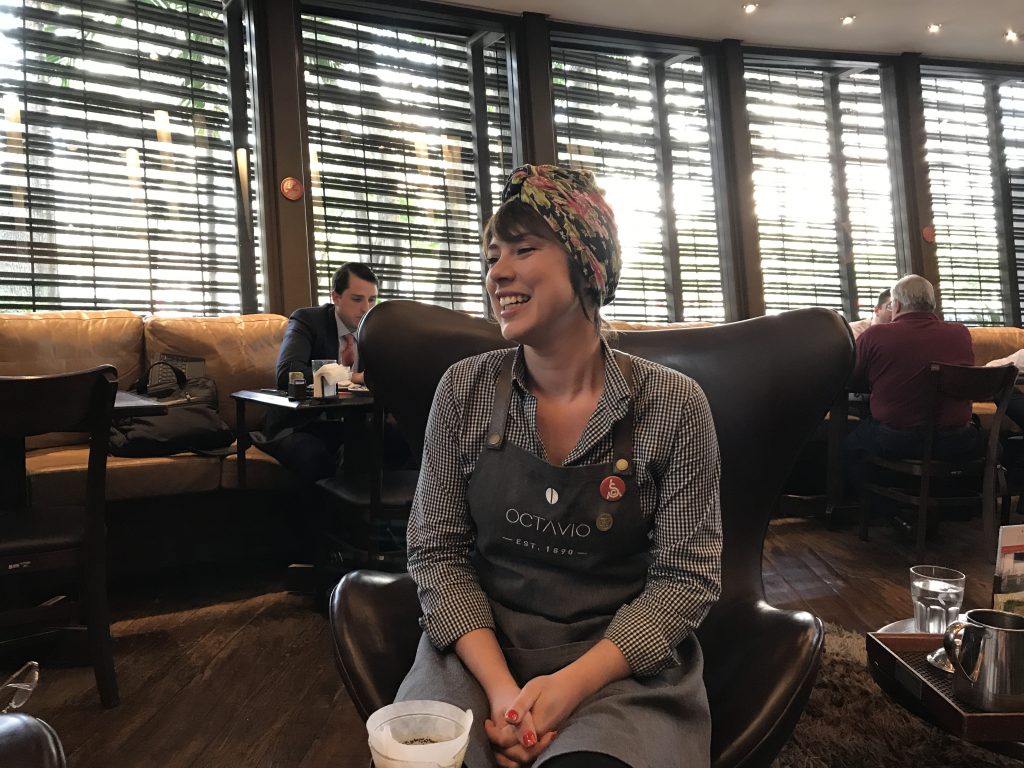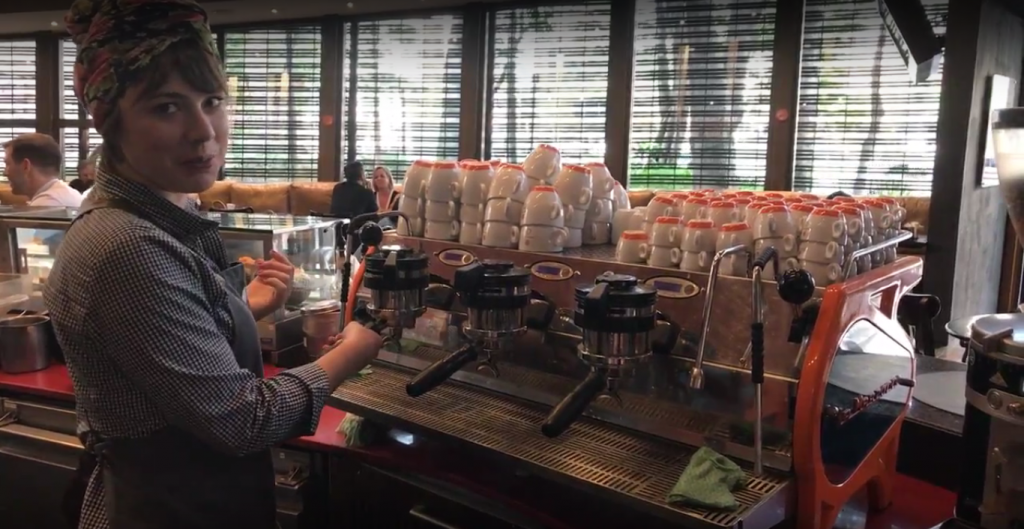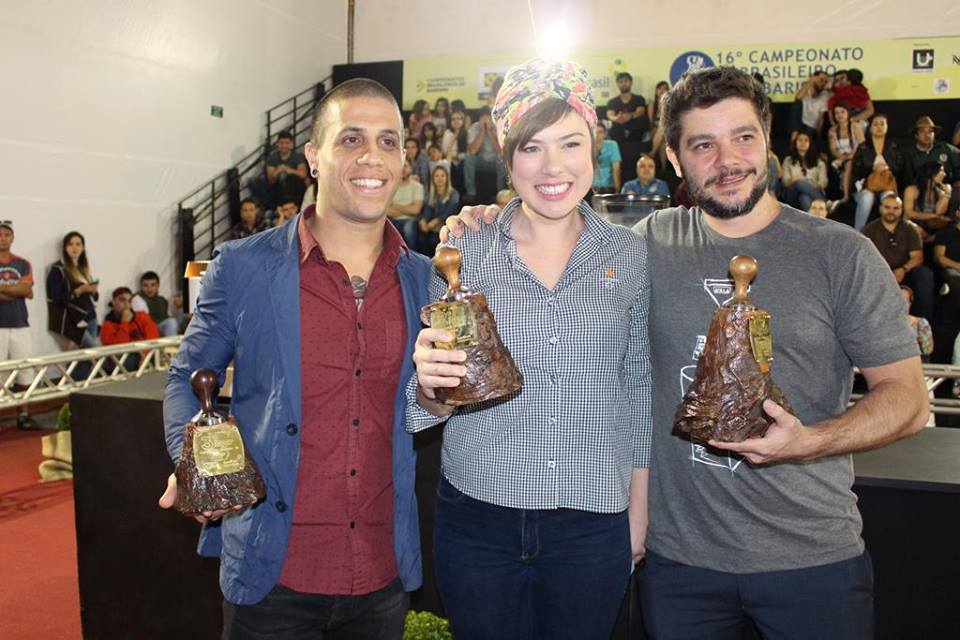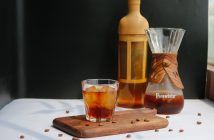The actress that became barista
Those who see Martha Grill agility while serving at Octávio Café halls, in São Paulo, would not believe that the professional is in the market for just one year.
Martha left the theater in Porto Alegre, where she directed a theater company whose play, called Cabaré Aurora, ran for unbelievable two years.
Sometimes a customer of the coffee shop recognizes Martha from her participations in important national movies, like ‘Tempo e o Vento’, of 1997, based on the homonymous work by Érico Veríssimo, the most ‘gaucho’ of ‘gauchos’.
Martha moved to São Paulo to take her chances in the theater of the largest metropolis in the country, seeking an eventual opportunity at Zé Celso company, from Teatro Oficina. But she got hurt, had to undergo a surgery, aborted the idea and, as she didn’t want to go back home, she needed to find a quick job and someone told her that there was a barista vacancy at Octávio Café. There was a problem, though. She didn’t even know that this profession existed.
The passion for special coffees was immediate. The interviewed received Grão Especial team with the same coffee she used during the Brazilian Barista Championship in 2017: Yellow Catucaí 2SL, from Matas de Minas region, between Espírito Santo and Minas Gerais states. From Vista Alegre ranch.

(Martha talking to the Grain Special: the smile that does not leave the face is the trademark of the barista!)
“The preparation for the championship occurred on short notice. Two months earlier I enrolled and asked for support from Octávio personnel. The Nova Faria Lima shop counts on a lower floor, where Martha prepared a work station, very similar to those of championships. Then I started to look for some courses to improve my knowledge”, she tells.
And, as it happens, Grão Especial team met the barista training in two different occasions: the first was in the Sensorial Essencial course, held at Sofá Café, in Centro Cultural Britânico, São Paulo west zone. “In this course I started to have ideas on how to base my presentation”, she says.
The second was the Advanced Barista course, by Wolf Café, with Danilo Lodi and Hugo Wolf himself, two of the best professionals in Brazil today, when it comes to special coffees. “With them I learnt the technique, they taught me different ways of diagnosing problems and finding solutions, something that changed my way of perceiving coffee”, she explains. And Grão Especial was there interviewing master roaster Hugo Wolf.

(The barista used to interview to prepare us an espresso in a La Marzocco)
After having concluded the courses, Martha tells that she was fully focused on the presentation. “It was tough; I had to change the coffee shop routine. We started little by little, assembling and disassembling the station every night. In the morning, I took the machine – which was, by the way, very heavy – , to the lower floor. At 10 o’clock pm, I took the machine back to the upper floor, because there would be an event at 8 o’clock am; the coffee shop needed the machine, and everything had to be cleaned… Next day, the movements started all over again.
In the last week, she went crazy! “I put my foot down and said to the management: we will win this championship, let’s leave this machine down there. I kept a machine that was very similar to that of the championship, La Marzocco FB 80, a model older than the Linea PB used in the championship”, she tells.
Back to coffee
Soon after serving coffee to our team, Martha comments: “by tasting the coffee I used in the Championship, you can immediately feel the molasses in aroma and taste. In the competition, honey appeared more, because it had less time from roasting. This one here is already two weeks old. Honey became molasses, and it had a very strong peach earlier. Today its taste is yellow fruits. This coffee finishing has also changed, but I still like it, I find it sweet, soft”, she explains.
And how was the harvest of coffee to the Championship? “That was the toughest part. At the time, it was the beginning of harvest. I took into my head that I had to look for a big coffee. Then I started to talk to people who knew about special coffees. They would send me samples, we roasted them, tasted, and waited for the next”, she recalls.
While seeking her coffee, the barista trained choreography, getting everything prepared without the coffees, leaving gaps in presentations to describe the drink she was supposed to serve.
“All of a sudden, with 10 days left until the contest, my friend Marquinho Gomes, from Ninho da Águia ranch, sends me to taste a Yellow Catucaí 2SL, from Matas de Minas, Vista Alegre ranch. Marquinhos said to me: this crop is tough, it is complicated, I haven’t yet drunk championship level coffee. Then one day he calls me and says he found the one. It was emotional”, he says.
Martha thanks Marquinho and the producer Fernando Heringer, as well as her coach Paulo Gabriel. “Without them I wouldn’t have won”, she says.
In other words, Martha prepared for two months and counted on two weeks of training. “One week in the lower floor alone, I lost four kilos”, she recalls. During this whole time, she spent four kg of coffee. “My initial plan was to have 15 kg, train with 10 kg and take at least five, but the reality was quite different”, she explains.
“We had few days to taste this coffee, so we roasted it on Friday and on Monday, and I had to go to São Lourenço, seat of the championship”, she recalls. “It was crazy, I couldn’t sleep, and I rested a little only during the four-hour trip to get there. And when we reached the right drink, it was a very exciting moment”, she says.
The presentation
For her presentation, the barista wanted to talk about beautiful things, about the facts that led her to abandon theater and embrace barism. She wanted to talk about the beauty of the work of families who plant special coffees at Serra do Caparaó. And she made it.
During the competition, her presentation counted on two different moments: one, based on her own improvement, her learning, her evolution. And the other, when she, while using her verve of actress, told how special coffees’ cultivation occurs in a region like Serra do Caparaó.
But, of course, there were also some problems to be solved. “I wanted to talk about the signature drink. Since I wanted to talk about the special coffee’s social responsibility, I wanted to use ingredients that showed this profile. However, harmonizing coffee is a very hard task”, she tells. To sum up the drama, Martha asked a friend specialist in ice-cream to help her. They tasted all flavors: and chose Japanese-plum and peach.
“In the end, everything was fine. In the first part of the presentation I used the Japanese plum with a wonderful honey and made a blend with plum and peach. Simple. I admit that it was the first non alcoholic espresso drink that I tasted and liked”, she tells.
The champion
Martha praises the jury and barista champion Léo Moço’s work. “I want to go back and make a technical presentation as beautiful as his, a benchmark in Brazil”, she praises.
The future
After the vice-championship, Martha tells that she ended up by becoming mentor of a new group of baristas. “I’m very glad, and for next year I hope we’ll have more women participating”, she says.

(Martha and his second place trophy, joins with the other two best Brazilian baristas in 2017: Thiago Sabino and Léo Moço)
She intends to spend more time at the countryside to get to know special coffee farms and acquire in-depth knowledge on this universe.
The coffee shops’ trend, according to her, is to invest more in internal championships, aiming at qualifying their employees. “We have a lot to evolve, and championships represent an important tool”, she observes.
Since our friend has guts, she will invest in a sensory course and try, very soon, the Qgrader. “I have to work a lot on my sensory aspect. For me this is the toughest thing. The technical aspect, you only have to drink a lot of coffee”, she says.
So far, special coffees thrashed the theater.



